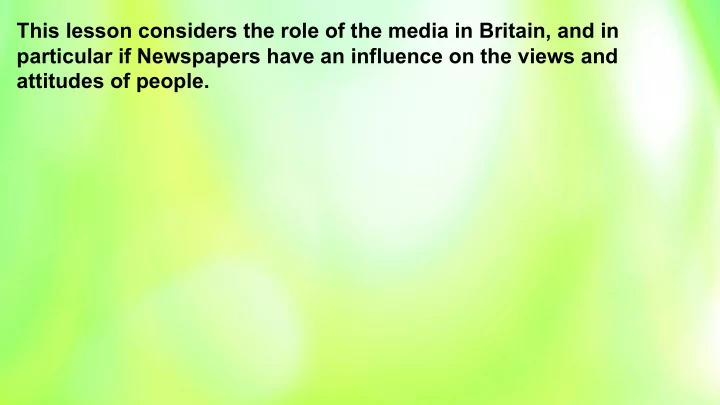

This lesson considers the role of the media in Britain, and in particular if Newspapers have an influence on the views and attitudes of people.
The Role of the Media The term media refers to a communication outlets used to store and deliver information. This includes the mass media communications industry , such as print media, publishing, the news media, photography, cinema, broadcasting (radio and television), and advertising. It is very difficult to ignore the power of the media in modern Britain. Newspaper headlines glare out at us from shops, we have access to more TV channels than ever before and people are able to connect and share information via social media.
The media in Britain [01] Write down all the media you have come into contact with over the past 24 hours. • What have you seen on TV • What have you read? • Listened to the radio or music? • Used social media? • Watched a film? • Seen (or heard) any adverts?
The news in Britain Have you ever wondered why TV news is always the same length each day? (apart from a crisis, when there may be an extended news broadcast) Journalists and media producers have to choose from the news events during the day and fill their available time slot. Therefore, the news reflects the views of those working in the media and what they find interesting. [02] Complete the attached activity ‘Making the News’ – you are now doing what journalists and media producers do every day!
[03] Consider the newspaper headlines on the next two slides . . . Do you they have an impact on what people think? Write a short paragraph explaining (a) what message these headlines give and (b) whether or not you think people take any notice of the headlines in newspapers.
A big debate in sociology concerns the power of the media and whether it has any influence on (a) Our opinions and attitudes (b) Our behaviour The next slide considers the political leanings of Britain’s daily newspapers. Which political party has most support from daily newspapers? Should we be concerned about this? Or, do newspapers reflect the views of the population?
One of my favourite debates in Sociology: Do newspapers lead public opinion? . . . . . or Do newspapers follow public opinion?
Answer these questions: [01] Does the media have any influence on what people believe? [02] If so, which aspect of the media has the most affect on people? [03] Do newspapers lead or follow public opinion? [04] What is meant by sensationalism? (you may have to look this up) [05] Why does the media often do this? (The next slide may help you with this answer – which of the three views do you most agree with?)
Why do the media sensationalise certain news stories? [1] ‘ The Grassroots Theory ’ = The media is simply reflecting what people in the UK are concerned about (e.g. lots of people in inner city area of the UK are worried about issues such as street crime) [02] ‘ The Interest Group Theory ’ = Exaggerating news stories benefits journalists and those working in the media (e.g. stories of frail old ladies being robbed by teenage yobs sells newspapers, and make for ‘interesting’ stories on TV) [03] ‘ The Elite Engineered Theory ’ = The powerful use the media to ‘distract’ us (e.g. stories about street crime and drug use diverts attention away from the more important social issues, such as industrial pollution, inequality, & poverty)
Recommend
More recommend